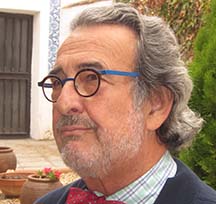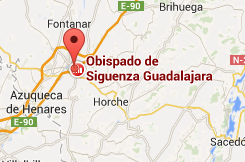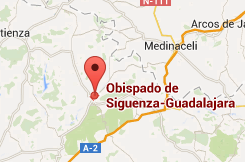 Por José Ramón Díaz-Torremocha
Por José Ramón Díaz-Torremocha
(de las Conferencias de San Vicente de Paúl en Guadalajara)
Email del autor: Esta dirección de correo electrónico está siendo protegida contra los robots de spam. Necesita tener JavaScript habilitado para poder verlo.
ATENCION: Al finalizar el artículo que sigue en español, está su traducción al idioma inglés. Si alguno deseara que se le enviaran estos artículos a algún otro consocio, en cualquiera de los dos idiomas, indíquelo a la dirección electrónica Esta dirección de correo electrónico está siendo protegida contra los robots de spam. Necesita tener JavaScript habilitado para poder verlo. facilitándome la dirección electrónica del consocio. Al igual que aquellos que no quieran seguir recibiéndolos. Muchas gracias por su atención
YOUR ATTENTION: At the end of the following article in Spanish, there is a translation into English. If any of you wish that other fellow members would receive these articles, in either language, please send a message to the e-mail address Esta dirección de correo electrónico está siendo protegida contra los robots de spam. Necesita tener JavaScript habilitado para poder verlo. indicating their e-mail address. For, those who do not want to receive them anymore, please follow the same procedure. Thank you very much.
Para atender las peticiones recibidas, a partir del próximo mes de junio, el artículo procuraremos enviarlo también traducido al francés.
To meet the requests received, from next June, we will try to send the article also translated into French.
Pour répondre aux demandes reçues, à partir de juin prochain, nous essaierons d’envoyer l’article traduit aussi en Français.
Ocurrió cuanto voy a contar, hace tiempo y lo viví acompañando a una querida consocia que visitaba nuestras Conferencias de Guadalajara y Alcalá, y que hacia una preciosa y muy bien estructurada presentación de las Bienaventuranzas como complemento de la formación para los miembros de cada una de ellas. Iba dirigida la charla de la consocia, a profundizar en este esencial mensaje de Cristo, apoyándose en el texto de Mateo que parece, para este fin de reflexionar en ellas, más apropiado que el de Lucas.
Después de comentar cada Bienaventuranza, los consocios, animados por la consocia experta que tutelaba la sesión, opinaban sobre cómo conseguir todo aquello con lo que Cristo identifica a los Bienaventurados o exponían sus dudas sobre cualquiera de ellas. Dudas en cuanto a poder llegar a alcanzar el preciado título de “Bienaventurado”. Las opiniones eran diversas, pero lo fundamental en aquella pequeña Conferencia, lo que se buscaba, como en todas las demás, era dar la oportunidad a todos de escucharse unos a otros sin atribuirse nadie protagonismo alguno. Era solo expresar lo que la Palabra de Dios había inspirado a cada miembro y era también, ocasión para profundizar en la comunidad que debe ser cada Conferencia. Ahondar en el conocerse y así poder ayudarse mejor entre ellos y a los que sufren para servirles.
No debemos olvidar nunca, esa aspiración fundamental en cada Conferencia, como lo fue en la primera, y que han alcanzado tantos santos ignotos pero que ya están en el Cielo. Nuestro objetivo de siempre, aún sin prestarle mucha atención en ocasiones, ha sido llegar a ser una auténtica Comunidad de oración y acción. Comunidad: preciosa palabra si la vivimos bien. Y cuanto bien nos haremos a nosotros y haremos a los demás con ella. Pues bien, ese es el camino, (el) meditar la palabra de Dios o algún asunto importante a los ojos de la Fe. ¿Qué dice el Evangelio? Pues a aplicarlo. Lo hacia muy bien la Conferencia. Mucho de su buen caminar, estaba en la actitud del Párroco que actuaba con la cercanía del padre y la modestia sapiencial del mejor maestro.
Se atragantaron con el trabajar por la Paz. ¿Quiénes eras aquellos bienaventurados que trabajaban por la Paz? Se embarulló un poco el intercambio de opiniones, nunca discusión que no debe haber en las Conferencias, pero no encontraban el ejemplo correcto de lo que debía ser trabajar por la paz. Podía hacerse decía uno, el trabajar por la paz si se era muy importante y con mucho poder. Otra, aseguraba que solo desde grandes instituciones o desde puestos políticos de importancia. ¿Qué cosa podría exigirles a ellos, pobres personas corrientes? Esa era la conclusión que poco a poco parecía que iba a imponerse. La consocia que tutelaba, que había permanecido en silencio, preguntó ¿Nada nos inspirará el Espíritu Santo que nos han regalado a los simples cristianos?
Animada, una consocia, contó lo que para ella había sido trabajar por la paz: eran muchos hermanos y entre ellos siempre encontraban motivo más o menos importante para pelearse. La consocia, contaba que ella procuraba intervenir en esos conflictos y trabajaba para procurar que se evitaran y no quedaran heridas entre los hermanos.
Se hizo un pequeño silencio. Un silencio sonoro. Ya no se hablaba de lo importante que se había de ser. Solamente había que ser. Que ser cristiano. Seguidor de Cristo. Sólo había que tener claro que trabajar por la paz, era ya un comienzo el guardarla personalmente y ayudar a hacerla guardar por el hermano. Por el prójimo.
Fue una bonita lección adquirida en aquella pequeña Conferencia.
Con María, siempre a Cristo por María
José Ramón Díaz-Torremocha
De las Conferencias de San Vicente
Guadalajara (España)
Nota: Para atender las peticiones recibidas, a partir del próximo mes de junio, procuraremos enviar el artículo traducido también al francés.
Please find below the text in english
WORKING FOR PEACE
What I am going to tell happened long time ago. I was going with a dear fellow member who was visiting our Conferences of Guadalajara and Alcalá, and who made a beautiful and very well structured presentation about the Beatitudes as a complement to the training for the members of each of these Conferences. Her talk was aimed at deepening this essential message of Christ, based on Matthew’s text which seems more appropriate than Luke’s one for the purpose of reflecting on it.
After commenting on each Beatitude, the fellow members, encouraged by the expert sister that was leading the session, gave their opinion on how to achieve everything with which Christ identifies the blessed, or they presented their doubts about any of them. Doubts about being able to reach the precious title of "Blessed”. There were different views. However, what was crucial in that small Conference, what they sought, as in the rest of Conferences, was to give everyone the opportunity to listen to each other without any one having the main role. It was just about expressing what the Word of God had inspired in each member and it was an opportunity to deepen the community that each Conference should be. To know better oneself in order to better help each other and those who suffer in order to serve them.
We must never forget this essential aspiration in every Conference, which was the aspiration of the first Conference, and which has been achieved by so many unknown holy men that are now in Heaven. Our objective, even when sometimes we do not pay much attention to it, has always been to become an authentic Community of prayer and action. “Community”: a beautiful word if we experience it in the right way. How much good we will do to ourselves and to others with it! Well, that is the path, to meditate on the word of God or on some important matter in the light of Faith. What does the Gospel say? Then, let us apply it. The Conference was doing it very well. Much of its good course lay on the attitude of the Parish Priest who behaved with the closeness of the father and the wise modesty of the best teacher.
They were challenged by this “working for Peace”. Who were those blessed people who worked for Peace? The exchange of opinions became a bit heated without being an argument, which should never exist in the Conferences, but they did not find the right example of what should be to “work for peace”. One member said that a person could work for the peace if he/she was very important and had a lot of power. Another member stated that it could only be carried out by large institutions or at important political levels. What could they be demanded, poor ordinary people? That was the conclusion that gradually seemed to prevail. The fellow member chairing the session, who had remained silent, asked, ‘will the Holy Spirit, which has been offered to us, inspire nothing to us, simple Christians?’
A fellow sister felt encouraged to explain what working for peace had been for her: they were many siblings and they always found a more or less important reason to fight among them. She told that she sought to intervene in these conflicts and struggled to avoid them so that there were no injuries among the brothers.
There was a short silence. A resonant silence. It was no more about how important one had to be. We just had to be. To be a Christian. A follower of Christ. It was enough to be clear that for working for peace, it was already a beginning to keep peace at personal level and help your brother, your neighbour keep it.
It was a beautiful lesson learned in that small Conference
With Mary, always towards Christ through Mary
José Ramón Díaz-Torremocha
Conferences of Saint Vincent
Guadalajara (Spain)
Note: to meet the requests received, from next June, we will try to send the article also translated into French.

















